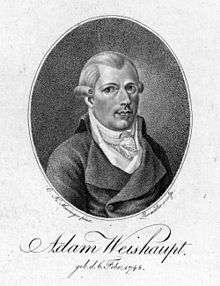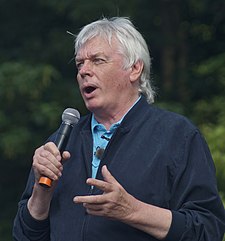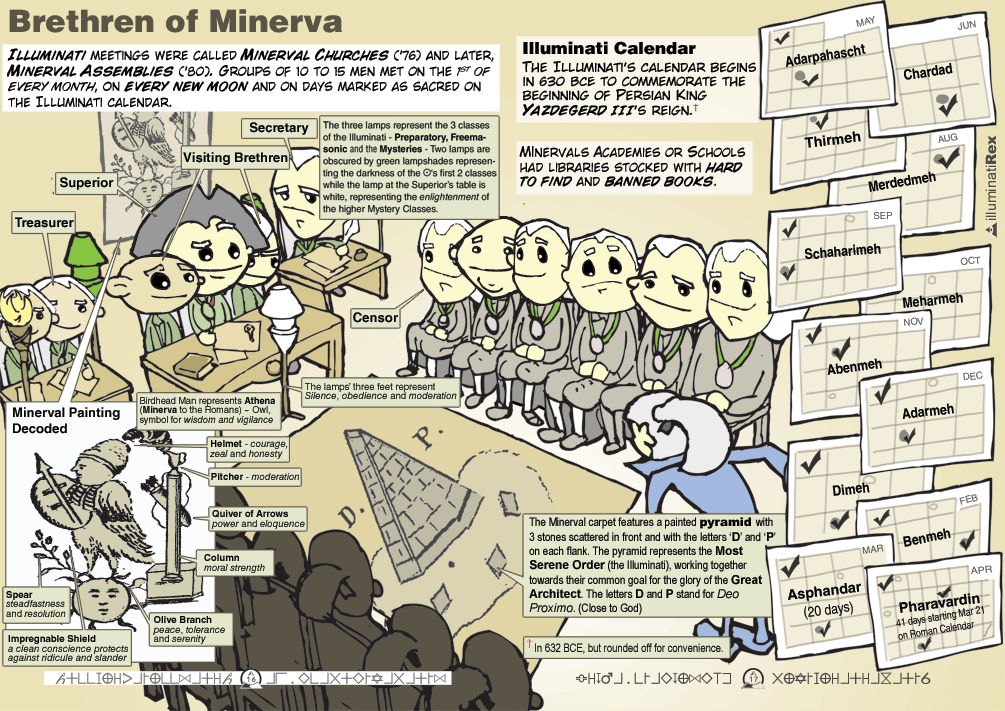The Illuminati were called Brethren of Minerva
KEY FIGURES:
Adam Weishaupt
Adam Weishaupt | |
|---|---|
 1799 portrait of Weishaupt | |
| Born | Johann Adam Weishaupt 6 February 1748 |
| Died | 18 November 1830 (aged 82) |
| Era | Enlightenment era |
| Region | Western Philosophy |
| School | Empiricism |
Main interests | Epistemology, Metaphysics, Ethics |
show Influences | |
show Influenced | |
Johann Adam Weishaupt (pronounced [ˈjoːhan ˈʔaːdam ˈvaɪshaʊpt]; 6 February 1748 – 18 November 1830)[1][2][3][4] was a German philosopher, professor of civil law and later canon law, and founder of the Illuminati.
Early life[edit]
Adam Weishaupt was born on 6 February 1748 in Ingolstadt[1][5] in the Electorate of Bavaria. Weishaupt's father Johann Georg Weishaupt (1717–1753) died[5] when Adam was five years old. After his father's death he came under the tutelage of his godfather Johann Adam Freiherr von Ickstatt[6] who, like his father, was a professor of law at the University of Ingolstadt.[7] Ickstatt was a proponent of the philosophy of Christian Wolff and of the Enlightenment,[8] and he influenced the young Weishaupt with his rationalism. Weishaupt began his formal education at age seven[1] at a Jesuit school. He later enrolled at the University of Ingolstadt and graduated in 1768[9] at age 20 with a doctorate of law.[10] In 1772[11] he became a professor of law. The following year he married Afra Sausenhofer[12] of Eichstätt.
After Pope Clement XIV's suppression of the Society of Jesus in 1773, Weishaupt became a professor of canon law,[13] a position that was held exclusively by the Jesuits until that time. In 1775 Weishaupt was introduced[14] to the empirical philosophy of Johann Georg Heinrich Feder[15] of the University of Göttingen. Both Feder and Weishaupt would later become opponents of Kantian idealism.[16]
Foundation of the Illuminati[edit]
On 1 May 1776 Johann Adam Weishaupt founded the "Illuminati" in the Electorate of Bavaria. Initially Illumination was designated for a group of outstanding and enlightened individuals in the society. Indeed, the word was adapted from a Latin root, Iluminatus, which directly translates to "enlightened." He also adopted the name of "Brother Spartacus" within the order. Even encyclopedia references vary on the goal of the order, such as New Advent saying the Order was not egalitarian or democratic internally, but sought to promote the doctrines of equality and freedom throughout society;[18] while others such as Collier's have said the aim was to combat religion and foster rationalism in its place.[19] The Illuminati was formed with the vision of liberating humans from religious bondage and undermining corrupted governments.[20]
The actual character of the society was an elaborate network of spies and counter-spies. Each isolated cell of initiates reported to a superior, whom they did not know: a party structure that was effectively adopted by some later groups.[18]
Weishaupt was initiated into the Masonic lodge "Theodor zum guten Rath", at Munich in 1777. His project of "illumination, enlightening the understanding by the sun of reason, which will dispel the clouds of superstition and of prejudice" was an unwelcome reform.[18][failed verification] He used Freemasonry to recruit for his own quasi-masonic society, with the goal of "perfecting human nature" through re-education to achieve a communal state with nature, freed of government and organized religion. Presenting their own system as pure masonry, Weishaupt and Adolph Freiherr Knigge, who organised his ritual structure, greatly expanded the secret organisation.[18]
Contrary to Immanuel Kant's famous dictum that Enlightenment (and Weishaupt's Order was in some respects an expression of the Enlightenment Movement) was the passage by man out of his 'self-imposed immaturity' through daring to 'make use of his own reason, without the guidance of another,' Weishaupt's Order of Illuminati prescribed in great detail everything which the members had obediently to read and think, so that Dr. Wolfgang Riedel has commented that this approach to illumination or enlightenment constituted a degradation and twisting of the Kantian principle of Enlightenment.[21] Riedel writes:
'The independence of thought and judgement required by Kant ... was specifically prevented by the Order of the Illuminati's rules and regulations. Enlightenment takes place here, if it takes place at all, precisely under the direction of another, namely under that of the "Superiors" [of the Order].[22]
Weishaupt's radical rationalism and vocabulary were not likely to succeed. Writings that were intercepted in 1784 were interpreted as seditious, and the Society was banned by the government of Karl Theodor, Elector of Bavaria, in 1784. Weishaupt lost his position at the University of Ingolstadt and fled Bavaria.[18]
David Icke
David Icke | |||||||||||||||||||||||||||||
|---|---|---|---|---|---|---|---|---|---|---|---|---|---|---|---|---|---|---|---|---|---|---|---|---|---|---|---|---|---|
 Icke in 2013 | |||||||||||||||||||||||||||||
| Born | David Vaughan Icke 29 April 1952 Leicester, England | ||||||||||||||||||||||||||||
| Occupation | Conspiracy theorist,[1] former sports broadcaster and football player | ||||||||||||||||||||||||||||
| Movement | New Age conspiracism | ||||||||||||||||||||||||||||
| |||||||||||||||||||||||||||||
| Website | davidicke | ||||||||||||||||||||||||||||
David Vaughan Icke (/ˈdeɪvɪd vɔːn aɪk/; born 29 April 1952) is an English conspiracy theorist and a former footballer and sports broadcaster.[1][3][4][5][6] He has written over 20 books, self-published since the mid-1990s, and spoken in more than 25 countries.[7][8][9]
In 1990, he visited a psychic who told him he was on Earth for a purpose and would receive messages from the spirit world.[10] This led him to state in 1991 he was a "Son of the Godhead"[6] and that the world would soon be devastated by tidal waves and earthquakes, predictions he repeated on the BBC show Wogan.[11][12] His appearance led to public ridicule.[13] The books Icke wrote over the next 11 years developed his world view of New Age conspiracism.[14] His endorsement of an antisemitic forgery, The Protocols of the Elders of Zion, in The Robots' Rebellion (1994) and And the Truth Shall Set You Free (1995) led his publisher to stop handling his books, which have been self-published since then.[9]
Icke believes the universe to consist of "vibrational" energy and infinite dimensions sharing the same space.[15][16][17] He claims an inter-dimensional race of reptilian beings, the Archons or Anunnaki, have hijacked the Earth and a genetically modified human–Archon hybrid race of shape-shifting reptilians – the Babylonian Brotherhood, Illuminati or "elite" – manipulate events to keep humans in fear, so that the Archons can feed off the resulting "negative energy".[15][18][19][20] He claims many public figures belong to the Babylonian Brotherhood and propel humanity towards a global fascist state or New World Order, a post-truth era ending freedom of speech.[14][15][21][22] He sees the only way to defeat such "Archontic" influence is for people to wake up to the truth and fill their hearts with love.[15] Critics have accused Icke of being antisemitic and a Holocaust denier with his theories of reptilians serving as a deliberate "code".[23][24][25] Icke denies these claims.[26]




Comments
Post a Comment